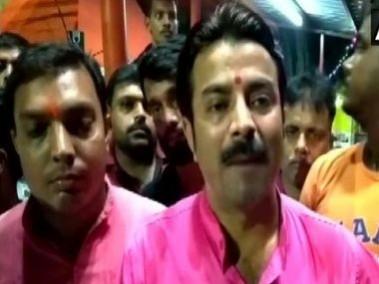
Members from the Bharatiya Janata Yuva Morcha (BJYM) recited Hanuman Chalisa near Bally Khal in Howrah, West Bengal, as a mark of protest against the Friday namaz offered on the streets, which allegedly block the main roads in the city.
#WATCH WB: Bharatiya Janata Yuva Morcha recite Hanuman Chalisa near Bally Khal in Howrah. OP Singh, BJYM Pres, Howrah says, "GT Road is blocked to offer Friday namaz. Patients die,people can't reach office on time.Recitation continues till Friday Namaz like that is offered (25.6) pic.twitter.com/BscHgYJt2C
— ANI (@ANI) June 26, 2019
The protestors gathered in large numbers on the streets on Tuesday night, and threatened to block all main roads to recite Hanuman Chalisa on all Tuesdays.
"In Mamata Banerjee's rule we've seen Grand Trunk Road & other main roads are blocked on Fridays for namaz. Patients die; people can't go to office on time. As long as it continues, we'll recite Hanuman Chalisa on Tuesdays on all main roads near Hanuman temples," said OP Singh, the District president of BJYM in Howrah.
The political and communal tension in West Bengal have only seemed to rise in the days after the the Lok Sabha election of 2019.
The recent protests come in the backdrop of an alleged attack on a Muslim youth, who was forced to chant 'Jai Shri Ram' in a train, at West Bengal's South 24 Parganas.
"Six more people and I were attacked by the group of people; although I tried to chant 'Jai Shri Ram' I couldn't because they kept beating me up. Then they pushed me off the train with two more people," said the victim Mannan Mullah.
Chief Minister Mamata Banerjee had earlier criticised Bharatiya Janata Party for chanting 'Jai Shri Ram' slogan in a "misconceived manner", also accusing them of mixing religion with politics.
The state has seen numerous instances of political violence after the election, with both Trinamool Congress and BJP blaming each other for the political killings of party workers and stoking political unrest.









!['Had denied Housefull franchise as they wanted me to wear a bikini': Tia Bajpai on turning down bold scripts [Exclusive]](https://data1.ibtimes.co.in/en/full/806605/had-denied-housefull-franchise-they-wanted-me-wear-bikini-tia-bajpai-turning-down-bold.png?w=220&h=138)



